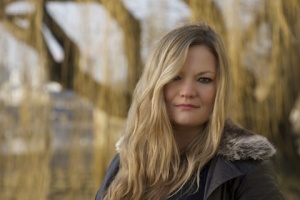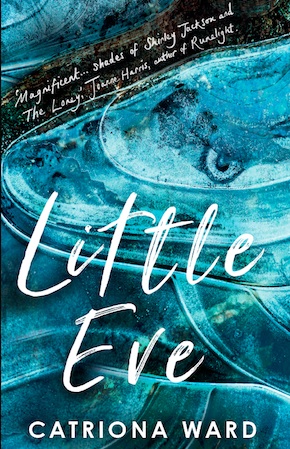Unflinching and unforgettable
by Irenosen OkojieCatriona Ward’s superbly crafted, atmospheric new novel Little Eve continues to expand her oeuvre as one of the most interesting writers in Britain today. Following on from her stunning gothic debut Rawblood (winner of the Best Horror Novel at the 2016 British Fantasy Awards, and shortlisted for the Authors’ Club Best First Novel Award), Little Eve starts with a beautifully creepy opening; in 1921, Highland butcher Jamie MacRaith heads to Altnaharra Castle with an order of beef only to find a devastating scene awaiting him. There has been a multiple murder on the castle’s secluded island. Family members are laid out in a stone circle on the grounds, having been killed by one of the daughters, Eve. One strand of the narrative follows Eve as a child, steadily edging towards mental decline. The other charts the aftermath of the murders through the diary entries and letters of Dinah, the only survivor. As Eve and Dinah’s disturbing story unfolds it becomes increasingly clear that one of them is an unreliable narrator. Pitched as The Loney meets The Girls, the novel presents the contrasting accounts of the two protagonists in taut, vivid prose.
Set during a period from World War I to beyond World War II, Eve and Dinah are unable to escape a community of strays and orphans ruled by the mysterious John Bearings. John, known forebodingly as ‘Uncle’, is a darkly seductive man who leads the group through rituals and the worshipping of snakes. Ward slowly draws us into the world of this cultish, fabricated family, cleverly and subtly destabilising the reader. From the beginning there is a sense that something isn’t quite right, although we don’t know what immediately. As we are pulled into the narrative and the story unfolds, an exploration of psychological, emotional and physical child abuse becomes integral. Ward handles this difficult content unflinchingly, taking us through the horrors of the girls’ realities as Eve at first longs to inherit Uncle’s power then begins to struggle with her faith and sanity, while Dinah craves something quite different.
Little Eve is a whydunnit, a psychological mapping of the trials and tribulations of two young girls growing up in a troubling, fractious community where dangers are both internal and external.”
The capricious plot unwinds at a steady pace, and Ward smartly misdirects at times to create an air of mystery. Unwilling to give too much away, she rewards the reader slowly, infusing Eve and Dinah’s trajectories with insidious horror as past and present converge. The language is disturbingly beautiful, delivering unsettling images that will stay with you long after the end. Little Eve is a whydunnit, a psychological mapping of the trials and tribulations of two young girls growing up in a troubling, fractious community where dangers are both internal and external. You become invested in these flawed anti-heroines, who never feel like they’re competing for space on the page, each distinct and intriguing in their own right.
The book tackles challenging elements of cults, faith and personal delusions, intricately interweaving them in a way that builds up the reader’s discomfort, shifting tone, tempo and perspectives with finesse. This study of the human condition is a tale for autumnal and wintery nights, curled up by a fire or by lamplight while a crawling sensation settles in the blood. If you usually baulk at the idea of picking up a horror novel, don’t. Little Eve has the hallmarks of the genre yet is accessible for readers who want to try a contemporary voice that lifts the book from the limitations of its box.
Masterful, dark, elegiac and electrifying, Little Eve is a hypnotic second novel from a writer whose work should be consumed with relish. If there’s any justice and Ward continues to produce books of this calibre, she should be up there with the likes of Iain Banks, Susan Hill and Andrew Michael Hurley. This is another chilling excursion into terror by a writer whose command of haunting landscapes and characters saturated with psychological terror makes for eerily sleepless nights; a fantastic, addictive, expertly rendered gothic thriller.
 Catriona Ward was born in Washington, DC and grew up in the United States, Kenya, Madagascar, Yemen and Morocco. She now lives in London and Devon. She read English at St Edmund Hall, Oxford and is a graduate of the Creative Writing MA from the University of East Anglia. Rawblood is now in paperback and Little Eve is in hardback, eBook and audio download from Weidenfeld & Nicolson.
Catriona Ward was born in Washington, DC and grew up in the United States, Kenya, Madagascar, Yemen and Morocco. She now lives in London and Devon. She read English at St Edmund Hall, Oxford and is a graduate of the Creative Writing MA from the University of East Anglia. Rawblood is now in paperback and Little Eve is in hardback, eBook and audio download from Weidenfeld & Nicolson.
Read more
@Catrionaward
 Irenosen Okojie is a writer and arts project manager. Her debut novel Butterfly Fish and story collection Speak Gigantular have won and been shortlisted for several awards. Her writing has been featured in The New York Times, the Observer, the Guardian, the Huffington Post and on the BBC.
Irenosen Okojie is a writer and arts project manager. Her debut novel Butterfly Fish and story collection Speak Gigantular have won and been shortlisted for several awards. Her writing has been featured in The New York Times, the Observer, the Guardian, the Huffington Post and on the BBC.
irenosenokojie.com
@IrenosenOkojie


